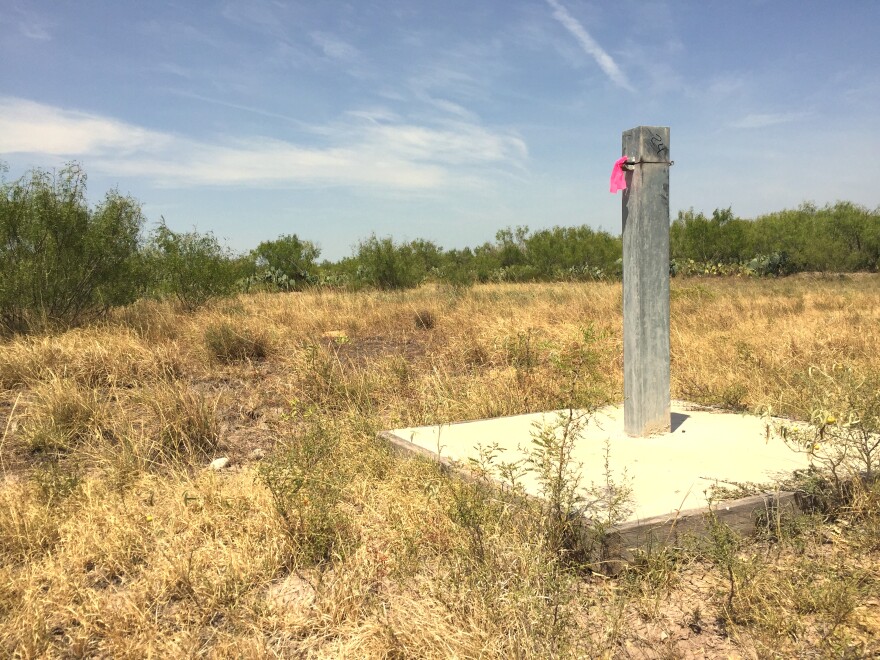Eduardo Davila moved his wife and kids from Laredo 20 miles east to a colonia called Ranchitos Los Centenarios because he thought the fresh air would be good for their asthma.
“After two years, the asthma had disappeared completely because the air is pure here,” says Davila, speaking in Spanish. “We want this unpolluted environment to continue to exist.”
Now, Davila and a dozen of his neighbors are meeting in a home just downwind from what could soon be the garbage capital of South Texas. Most are wearing red T-shirts with the words “No Landfill” printed on them. Hundreds of families live in these communities. And they’re worried.
“No lo queremosaqui,” says Olga Carrasco: “We don’t want it here.”

A Laredo oilman is looking to build one of the largest landfills in Texas on ranch land nearby. The dumpsite would be one of a fraction statewide that will welcome what’s called ‘Class 1’ industrial waste—which regulators say poses health risks when mishandled.
These residents are part of a growing chorus of critics say importing waste is an unwelcome risk.
Felicitas Samaniego says when she first heard about the project, she was shocked.
“What I felt was that I needed to fight for my kids,” says Samaniego, speaking in Spanish. “Why are they coming out with this that they want to bring trash and contaminate the air? I don’t have money to take my kids to the doctor. I don’t have money to move with them. I’m alone with my kids.”
Drive five miles from here, down unpaved roads, and you’re on a pancake-flat stretch of land called the Yugo Ranch. More than 650 acres of this could soon be filled with material like coal ash and fracking waste, if developer C.Y. Benavides III gets his way.

“We just didn’t decide we wanted to be in the landfill business,” says Benavides. “We were told 37 years ago by a geologist that our location was the most suitable place in the state of Texas for a landfill because of the anomaly of clay conditions that exist.”
Benavides says the clay-like conditions here will keep contaminants out of the water table. He claims his remote facility will be safer than the city dump, because that one’s near more Laredo houses.
Standing in the exact middle of where the proposed landfill would sit, it’s nothing but prickly pear cactus and mesquite trees as far as the eye can see—aside from a few roofs peeking out from neighboring ranches. Benavides says his ‘Pescadito Environmental Resource Center’ will provide 45 jobs and meet waste management needs for Laredo, but he plans to bring the waste in on trucks and trains from across Texas, other states, and Mexico.
“It’s location, location, location,” says Benavides. “The No. 1 inland port in the world. I think that the nation and the world are looking at disposal in a very different way, where waste by rail is the future.”

Webb County’s two existing landfills bring in about 408,000 tons of waste each year. Benavides plans to eventually bring in more than 9 times that. Twenty percent can be that Class 1 waste. Thousands in Laredo have signed petitions against the project, but Benavides says they’re confused.
“The No. 1 thing people have talked about is the situation about being hazardous,” says Benavides. “There’s a difference between hazardous and toxic. All permits, all have toxic language inside them.”
While some of the waste in Pescadito will be toxic, it’s all considered ‘non-hazardous’ by the Texas Commission on Environmental Quality—or TCEQ—as long as Benavides does things like line the waste pits and keep the waste covered.
The TCEQ is the group that decides whether this landfill happens. Back in March, it granted a draft permit. But those following the project say just because the landfill follows regulations doesn’t mean it will be totally safe.
“All landfills eventually leak, right?,” says Tricia Cortez, executive director of the Rio Grande International Study Center in Laredo. “You have these liners, you have these barriers, but they just delay the inevitable.”
She does not oppose the landfill outright, but her environmental nonprofit has pressing questions about water pollution, air emissions, health risks and the possibility of the landfill project contaminating the Rio Grande.
“Sixty percent of it is in floodplain,” says Cortez. “There are two tributaries that make their way into the river.”

All of these issues were raised at a packed public hearing with the TCEQ last week. Colonia resident Alejandro Obregon was pleased to see most of the hundreds there were against the landfill proposed near his home.
“We feel discriminated because, sincerely, if there were a different class of inhabitants living here, they would not be putting this landfill here,” Obregon says.
Obregon’s neighbor Pablo Lemos says the state shouldn’t have to shoulder more than its share of waste either.
“I don’t know why they’re making it so that trash from so many states would be brought here,” says Lemos, in Spanish. “And like they say, ‘Don’t Mess with Texas.’ Look, they say they want to keep Texas clean. Now Texas is going to be a dump with the way they are making it.”

The contentious public hearing also exposed some potential problems with the landfill application. Benavides’s plan to remove the landfill from the floodplain had been approved by federal and county officials, but Webb County Planning Director and Floodplain Administrator Rhonda Tiffin said inconsistencies in his permit applications mean the approval is not valid.

“If the applicant were to come today and request a permit—the floodplain development permit—I would have to deny it,” Tiffin told TCEQ staff.
Also, while the TCEQ had approved a preliminary permit for the landfill this year, the Commission says it’s now reversed course—and is taking another look at Benavides’ application.
The Pescadito landfill permit is expected to go before a full administrative review hearing before any final decisions are made.









